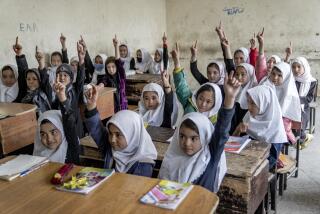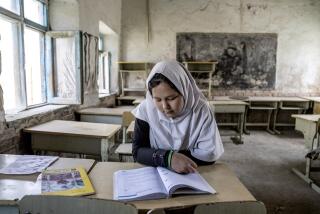Secular Turkey Debates Role of Muslim Schools
- Share via
ANKARA, Turkey — Mukaddes Erzeren’s parents threw a party to celebrate her enrollment last fall at the super-competitive Tevfik Ileri junior high--but not because attending the school would be a smart career move for an aspiring engineer.
“They rejoiced because I could become a good Muslim and cover my head,” said the gangly 12-year-old, her bespectacled face framed by a tight white scarf identical to those of her classmates. “This scarf is part of my religion.”
The junior high is one of 610 Islamic academies that have sprouted across Turkey to meet a growing demand for religious education and freedom in the Middle East’s most rigidly secular Muslim society--where public-school girls and female civil servants are barred by law from covering up.
In recent weeks, the academies have become targets of the Turkish military, which calls them breeders of Islamic fundamentalism and wants to slash their enrollments. The accusation has fueled a crisis that could bring down modern Turkey’s first Islamist-led government, which refuses to curb the schools.
So divisive is the conflict between supporters of Prime Minister Necmettin Erbakan’s 10-month-old coalition and secularists backed by the army that children as young as Mukaddes feel caught up in it.
“They’re so scared of us,” she said during a break at the school’s concrete campus in Ankara, the Turkish capital. “But they will never have the power to shut us down.”
Twice this year the five generals on Turkey’s National Security Council have pressed for specific steps to roll back Islamic influences not only in education but in foreign policy, broadcasting and other areas of public life. Rumors of an imminent coup have swept the country for weeks.
Militant secularists, most of them women who fear that scarves or veils will eventually be imposed on them, have marched in Ankara in the first mass protests against Erbakan’s government. And in a counterdemonstration in Istanbul on Sunday, hundreds of thousands of people chanted verses from the Koran to protest the military’s moves against the schools.
The struggle is being watched closely throughout the Islamic world, where Turkey has been a model for moderate leaders. Kemal Ataturk, Turkey’s ruler after World War I, abolished the Islamic caliphate and declared a secular, democratic and European state.
Turkey’s armed forces, self-appointed guardians of that identity, have seized power three times since 1960, but their latest ultimatums have been largely ignored. While he withdrew a bill to lift the 52-year-old restriction on religious head coverings, Erbakan has stood firm on other points and held together his coalition with the secular True Path Party of former Prime Minister Tansu Ciller.
The generals make clear in private that “secularism means more to them than democracy,” said a diplomat in Ankara, noting their fear that Turkey could become a theocratic state like neighboring Iran. “They hope they will not have to intervene . . . but they cannot allow this standoff to continue.”
Erbakan, whose Welfare Party won 21% of the vote in December 1995, the last elections, has backed away from campaign pledges to quit the North Atlantic Treaty Organization and break with Israel. Those ties are valued by the military commanders. But he is courting the regimes in the Muslim countries of Iran, Iraq and Libya.
The military’s first open challenge came in February after the mayor from Erbakan’s party in Sincan, an Ankara suburb, invited the Iranian ambassador to a rally and both men called for a Turkey ruled by Islamic law. The mayor went to jail, the ambassador went home under an expulsion threat, and tanks rolled in the suburb’s streets.
Many Turks were stunned by the mayor’s outburst of radicalism. In its search for the reason, the military singled out the Islamic academies, which started in the 1950s to train boys from the sixth grade and up to lead prayers in mosques.
In a report this month, the office of the armed forces chief of staff noted that these imam-hatip vocational academies, which are administered by the state, have evolved since the 1980s into prep schools as well as places for religious training and that they now admit girls.
The academies, the report asserted, are producing an Islamist electoral base. They are growing so fast, it warned, that academy graduates--coupled with those finishing evening or summer courses in the Koran, the Muslim holy book--would be enough to produce a landslide in the 2005 elections, enabling Islamists to rule without restraint by secularist allies.
“Our educational system is producing two mind-sets. One is loyal to secularism. The other takes a different view of the world, one that looks to the East and uses the Koran as a reference,” said Sedat Ergin, Ankara representative of Hurriyet, one of Turkey’s largest newspapers. “We are entering a period when secular values can no longer be taken for granted.”
The Islamic academies have an enrollment of about half a million junior high and high school students in a country of 64 million people. Financed by parents and private donors as well as by the state, the academies often are better equipped and staffed than Turkey’s underfunded secular schools. And because of religious discipline, they are freer of drugs, gang fights and other distracting social problems, parents and teachers say. Their graduates score higher on university entrance exams.
Some Islamic academies turn away 80% of all applicants for lack of room. Others have expanded with municipal funds after demonstrations by parents demanding enrollment for their children.
“Secular forces have themselves to blame,” said former Prime Minister Bulent Ecevit, a socialist. “For decades, the state has left a vacuum in the educational field that is now being filled by radical Islamic groups with ample financial means.”
The military is demanding a law that would raise the mandatory period of secular education from five years to eight, thus abolishing the academies’ junior high sections. Erbakan has resisted the change.
“The secularism they preach here is like atheism,” said Abdullah Gul, one of Erbakan’s ministers of state. “I want my son to know something about his religion. If you demand this fundamental right, you are branded a fundamentalist.”
The Islamic junior high option is especially important for religiously observant Muslim girls. The Koran teaches females who have reached puberty to cover themselves in public so as not to arouse men.
Girls interviewed at two Islamic academies, in Ankara and Istanbul, said being allowed to wear a scarf was a big factor in their choice of schools--all insisted that their parents left the decision to them--along with the chance to prepare for a secular profession while studying Arabic, the Koran, Islamic law and the prophet Muhammad’s teachings.
Supporters and critics of the system agree on one thing: Religious training has a bigger impact in junior high than it does later. “After a kid reaches puberty, it’s harder to put him in a room and make him memorize the Koran,” admitted one Islamic scholar working for the government.
Aside from the scarves, the prayers, the separate classrooms for boys and girls, and the religion classes, which take up at least 13 hours a week out of 40, the academies look a lot like regular Turkish schools. Soccer matches and whirling jump-ropes crowd the segregated playgrounds. In a nod to the secularist system that runs them, the academies display busts and quotations of Ataturk in the halls.
Students and administrators espouse tolerance for the rights of less-observant Muslims, including the many teachers allowed to give nonreligious instruction at the schools without wearing scarves.
“We’re part of the system. We respect the system,” said Hamit Karadeniz, principal of the 6,000-student Tevfik Ileri school here. “None of our graduates has ever thrown a bomb or shot a policeman. If they shut us down, they’re likely to start a movement of underground schools that will really confront the system.”
But his classrooms and others are full of children bent on changing the system from within.
During a discussion at the Kadikoy school about careers, Guzeya Cebeci, 17, announced plans to enter law school, even though a lawyer may not cover her head in a Turkish court. She does not plan to remove her scarf.
“It will be years before I graduate, and the country is changing,” she said. “Maybe . . .”
Esma Bora, a classmate and aspiring politician, interrupted her. “The first thing I’ll change is that stupid rule against scarves,” she declared, “so my friend can become a lawyer.”
Richard Boudreaux was recently on assignment in Turkey.
More to Read
Sign up for Essential California
The most important California stories and recommendations in your inbox every morning.
You may occasionally receive promotional content from the Los Angeles Times.










